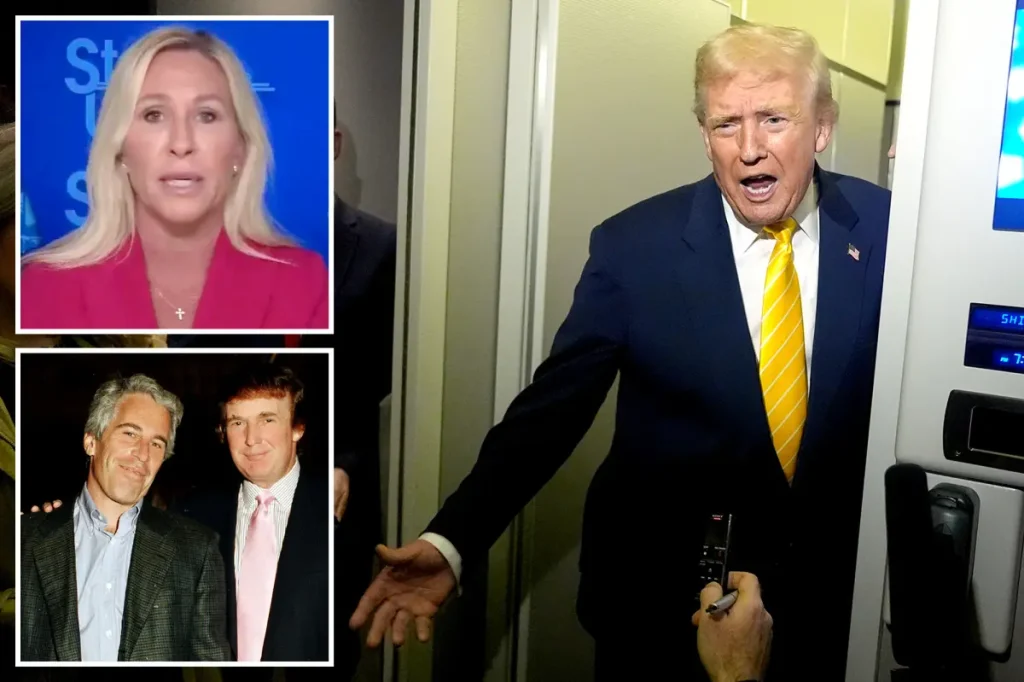Trump and Greene: A Complex Political Relationship in Turmoil
In the ever-evolving landscape of American politics, few relationships have been as publicly tumultuous as that between former President Donald Trump and Representative Marjorie Taylor Greene. Despite being one of Trump’s most vocal supporters in Congress, Greene has recently found herself at odds with the former president, culminating in a public spat that has captured national attention. During a revealing interview on CNN’s “State of the Union,” Greene attempted to navigate the complex terrain of maintaining her support for Trump while expressing her disagreements with some of his recent actions and decisions. “I do support him and his administration, and I support them in delivering the campaign promises we made to the American people,” Greene stated, before acknowledging the personal impact of their dispute by adding, “His remarks, of course, have been hurtful.” This tension between loyalty and criticism reflects the broader challenges facing the Republican Party as it grapples with its identity and direction in the post-Trump presidency era.
The conflict between these two prominent Republican figures reached a boiling point when Trump withdrew his endorsement of Greene’s reelection campaign, accusing her of having gone “far left” – perhaps the most damning criticism in MAGA circles. This dramatic action followed months of Greene periodically criticizing Trump, particularly urging him to focus more on domestic issues rather than international affairs. Greene attributed their disagreement primarily to differences over the handling of files related to Jeffrey Epstein, the notorious sex offender whose case continues to cast a shadow over American politics. “Unfortunately, it has all come down to the Epstein files,” Greene explained. “I stand with these women. I stand with rape victims, I stand with children who are in terrible sex abuse situations, and I stand with survivors of trafficking.” Her firm stance on this issue reveals the complex moral and political calculations that underpin even the most seemingly steadfast political alliances, highlighting how principles can sometimes transcend partisan loyalty.
Throughout her interview, Greene presented a nuanced perspective on her relationship with Trump – expressing hope for reconciliation while simultaneously questioning whether his recent actions align with the “America First” platform that propelled him to power. She specifically criticized Trump’s decision to welcome Syrian President Ahmed al-Sharaa to the White House, his positions on H-1B visas, and his international travel agenda. “I can disagree with the president at times,” Greene noted, “especially this past Monday, on the Marines’ 250th anniversary, when he honored the new Syrian president, who is an Al Qaeda terrorist and was wanted by our government for years.” This willingness to publicly criticize Trump on matters of foreign policy represents a significant departure from her previously unwavering support and signals her attempt to carve out an independent political identity while still remaining within the broader MAGA movement.
The conflict between Greene and Trump illustrates the challenges of maintaining political alliances in an era of personality-driven politics. Greene, who built her political brand largely on her alignment with Trump and his policies, now faces the difficult task of navigating her own political future without the explicit backing of the former president. Her assertion that “I certainly hope that we can make up” reveals both a personal and political desire to repair the relationship, recognizing that in the current Republican ecosystem, Trump’s favor remains a valuable political currency. Yet her continued criticism suggests she is also calculating that there may be political advantage in demonstrating independence from Trump, particularly on issues where his positions might not align with the preferences of her constituency or the broader conservative base.
The tension between Greene and Trump also reflects larger fissures within the Republican Party regarding policy priorities and the direction of the MAGA movement. Greene’s emphasis on domestic issues and her criticism of Trump’s foreign policy engagements highlight an ongoing debate about the practical implementation of “America First” principles. Is this philosophy best expressed through international disengagement, or can it encompass certain forms of global leadership? Should economic policies prioritize American workers even at the cost of business interests? These are not merely academic questions but central concerns that will shape the Republican platform and messaging in coming elections. The public disagreement between these two high-profile figures brings these debates into sharper focus, potentially influencing how other Republicans position themselves on these issues.
As this political drama continues to unfold, it serves as a reminder of how personal relationships, policy disagreements, and political calculations intertwine in American politics. The Greene-Trump dispute is not merely a personal falling out between two political allies but a window into the evolving dynamics within the Republican Party. Whether this represents a significant realignment or merely a temporary disagreement remains to be seen. However, it clearly demonstrates that even in a political movement often characterized by demands for loyalty, there remains space for dissent and disagreement – though not without consequences. As both Trump and Greene move forward with their respective political agendas, their relationship will likely continue to serve as a barometer for the broader currents within American conservative politics, reflecting the complex interplay of personality, principle, and pragmatism that defines our current political moment.


